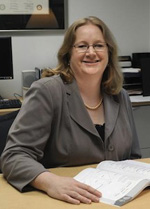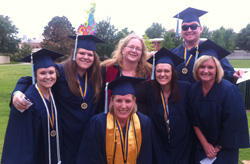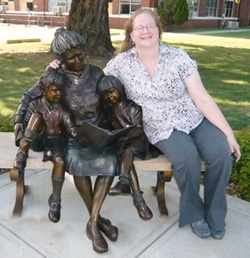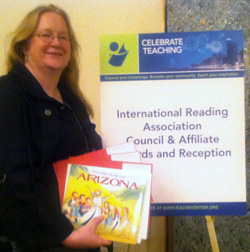University of Central Oklahoma Assistant Professor Julie Collins was just appointed an IRA Government Relations Committee Co-Chair with Pamela Hamman. In this Reading Today article, she shares her passion for teaching, her excitement for the upcoming IRA Annual Convention, and what she thinks legislators need to know about the education field today.
 When did you know you wanted to be a teacher?
When did you know you wanted to be a teacher?
I know that this will seem like a cliché, but one of my strongest memories from growing up is playing school in the basement. I had a desk set up and would use the school supplies that we were allowed to bring home from school at the end of the year. I remember always being the teacher and playing with neighborhood children, or stuffed animals and dolls, as the students. While I cannot say for sure that I knew at that point that I wanted to be a teacher, I know that it was the beginning of my intrigue with the art of teaching, copying what I observed my elementary school teachers doing every day in the classroom. Later, my love of working with children led me to major in Elementary Education, and then my desire to learn more about teaching my students to read proficiently led me back to graduate school.
Which books (from children's literature to professional) influenced your decision to become an educator?
The first book that influenced me to become a teacher is Tales of a Fourth Grade Nothing by Judy Blume. My third grade teacher read this book aloud to our class and it created a happy memory for me, and an enduring example of the impact of teacher read alouds.
While I cannot think of any professional books that influenced me prior to becoming an educator, there are quite a few that have helped shape me into the teacher I have become during my practice. One that stands out to me is Invitations by Regie Routman. This book was selected to use as a book study with my elementary school faculty, and helped to shape meaningful changes in my literacy instruction, including strategies for spelling instruction that I teach to my graduate students today.
How did you begin your career, and what led you to your current position?
 I started my teaching career in Oklahoma City Public Schools, teaching half day kindergarten at two different school sites. I taught in Oklahoma City for five years, teaching kindergarten and 2nd grade. I changed districts to teach in Norman, OK, where I live, at that point, and taught 1st grade and Transitional 1st grade for three years at Jefferson Elementary School, before becoming the Title I Reading Specialist at that site. After fourteen years of teaching, I worked for three years at the Oklahoma State Department of Education in the Federal Programs Division and then in the Curriculum Division as the Director of Literacy. Following this, I spent three years as the Director of Elementary Language Arts in Putnam City Schools in Oklahoma City, OK. During this period I completed my Ph.D. in Instructional Leadership and Academic Curriculum in Literacy Education. I was able to teach as an adjunct instructor at the University of Oklahoma during these time periods as well. In August of 2008, I began my current position as an Assistant Professor at the University of Central Oklahoma in Edmond, OK.
I started my teaching career in Oklahoma City Public Schools, teaching half day kindergarten at two different school sites. I taught in Oklahoma City for five years, teaching kindergarten and 2nd grade. I changed districts to teach in Norman, OK, where I live, at that point, and taught 1st grade and Transitional 1st grade for three years at Jefferson Elementary School, before becoming the Title I Reading Specialist at that site. After fourteen years of teaching, I worked for three years at the Oklahoma State Department of Education in the Federal Programs Division and then in the Curriculum Division as the Director of Literacy. Following this, I spent three years as the Director of Elementary Language Arts in Putnam City Schools in Oklahoma City, OK. During this period I completed my Ph.D. in Instructional Leadership and Academic Curriculum in Literacy Education. I was able to teach as an adjunct instructor at the University of Oklahoma during these time periods as well. In August of 2008, I began my current position as an Assistant Professor at the University of Central Oklahoma in Edmond, OK.
You are the Reading Program Coordinator/Advisor at the University of Central Oklahoma. What does that role entail?
My role as Program Coordinator connects me to my students and to the International Reading Association. This position involves advising the students in our Masters of Reading Program from the time that they are admitted to graduate school through completion of their degree and completing their path to certification as a Reading Specialist. The position also involves overseeing the curriculum and assessment of our program to be sure that we are meeting the IRA’s Standards for Reading Professionals, Revised 2010. These standards are used for accreditation of reading programs across the country.
You just became an IRA Government Relations Committee Co-Chair (working with Pamela Hamman and Rich Long). What brought you to this position?
I am delighted to serve the International Reading Association as co-chair of the Government Relations Committee. Advocacy is a professional interest of mine, and I am thrilled to be involved with this committee. Committee membership is a terrific way for members to become more involved in IRA. I previously served on the IRA Classroom Teacher Award Committee. This experience provided interesting work for me on several levels. I was amazed that such a small number of applications were received for each of the awards that the committee facilitated. After serving on this committee for several years, I was appointed to the Government Relations Committee, and then was appointed Co-Chair for this year. Committee work provides an opportunity to work with members with a range of experience to facilitate the important work of IRA. I encourage members to check out this site which provides information about each of IRA’s committees, as well as a link to the form to volunteer or nominate a colleague to serve: /general/AboutIRA/Governance/Committees.aspx.
One of the responsibilities of the Government Relations Committee is scoring the Advocacy Award submissions from state councils. This is an important initiative encouraging IRA’s state councils to be involved in the advocacy process. We have quite a few state councils doing a terrific job with advocacy, but we have room for growth in this area. Information about the Advocacy Award can be found at /Resources/AwardsandGrants/council_advocacy.aspx. If you are involved with your state council and would like to help them become more involved in advocacy efforts, I encourage you to check out the information!
What do you think are the most important education issues and concepts for legislators to understand?
 Wow, this is a loaded question! I believe that it is extremely important for teachers to become active in advocating for their work and their students. I think that it is important for legislators at the state and federal level to hear from teachers and know about their commitment to the work that they have chosen and to the students that they teach. There are important issues involving education being discussed at local, state, and federal levels, and it is important for policy makers to hear from the dedicated teachers across our country who are implementing the curriculum and assessment mandates. I have found that citizens are often hesitant to contact their legislators as people often do not think that their single voice will make a difference; however, legislators often do not hear from constituents and hearing from even a small number of contacts can influence them.
Wow, this is a loaded question! I believe that it is extremely important for teachers to become active in advocating for their work and their students. I think that it is important for legislators at the state and federal level to hear from teachers and know about their commitment to the work that they have chosen and to the students that they teach. There are important issues involving education being discussed at local, state, and federal levels, and it is important for policy makers to hear from the dedicated teachers across our country who are implementing the curriculum and assessment mandates. I have found that citizens are often hesitant to contact their legislators as people often do not think that their single voice will make a difference; however, legislators often do not hear from constituents and hearing from even a small number of contacts can influence them.
On a general level, the implementation of the Common Core State Standards is an important topic at the moment at the federal and state level as the majority of states have adopted the standards. Personnel in these states are currently working to transition to implementing these standards and the related assessments, which are being developed by two consortia. One of the most important things a teacher can do is to make personal contact with their legislators. Offer to provide information. Invite them to your classroom. Personal relationships can grow into advisory relationships through the trust developed. This contact can illuminate and personalize the information that the legislators are reading about in the bill proposals coming across their desks. It is important for teachers to remember that they are the ones with daily experience with curriculum and assessment and their views are important! Share your opinions with your legislators about the investment of time that you have in ongoing professional development and preparation for teaching. As a teacher, educate yourself about the current conversations going on at your local and state level, as well as on the national stage. It is better to become informed and share your opinion through the process, than to learn of a new requirement after the fact when a bill proposal becomes a law.
What do you consider to be your proudest career moment?
My proudest moments are hearing from students about their accomplishments and how their education has influenced their careers. Hearing or reading a “thank you” from a student absolutely makes my day and is a reminder of the important work that I am involved with on a daily basis.
Will you be attending the IRA Annual Convention in San Antonio in April? If so, which sessions are you looking forward to attending?
 Yes, I am looking forward to attending the annual convention in San Antonio.
Yes, I am looking forward to attending the annual convention in San Antonio.
The session that I am most looking forward to attending is the IRA Government Relations Committee Symposium: The latest updates from PARCC and Smarter Balanced Consortia - Important Common Core State Standards Connections for You! This session will feature representatives from both PARCC and Smarter Balanced discussing their progress in creating the assessments for the Common Core State Standards. This is an important topic for all educators. Dr. Rich Long will also be providing information about legislative updates as well as updates on IRA Advocacy Activities. This symposium is scheduled for Monday, April 22 at 9:00 a.m.
Additionally, I am looking forward to the Research Sessions included throughout the convention. The Research Address, featuring Brian Cambourne, and two sessions featuring updates from the IRA Literacy Research Panel will be held on Saturday, April 20. Participants should also check the program for other research sessions scheduled throughout the convention.
As a teacher educator, what's the most valuable advice you can give to someone entering the field?
My first advice to new educators is to remember the passion that brought you to the profession to begin with, as that is what will help you find joy in your day to day work.
Second, do not forget the importance of life-long learning and ongoing professional development. Your initial teacher education prepared you to be an excellent beginning teacher. Do not feel that you need to have the answer to every question. A professional home in the International Reading Association can provide support for you throughout your career. Involvement at the local and state level will provide networking with colleagues and opportunities for growth in knowledge and leadership. Membership provides resources to support your ongoing learning through journals, books, and conference opportunities.
What do you like to do when you're not wearing your educator hat?
I enjoy reading, traveling, college sports, and spending time with my husband and son.